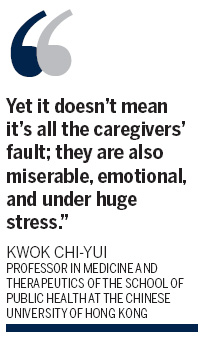Elderly dementia sufferers abused by families: Survey
Updated: 2010-05-13 07:38
By Guo Jiaxue(HK Edition)
|
|||||||||
62.5 percent of caregivers admit to psychological mistreatment
A survey reveals that over 60 percent of family caregivers who take care of seniors suffering dementia admit to abusing them to varying degrees. The survey results were released Wednesday.
"The abuse of elderly people with dementia has been quite common," said geriatrics expert Kwok Chi-yui, Professor in Medicine and Therapeutics of the School of Public Health at the Chinese University of Hong Kong.
The survey finds that 62.5 percent of the respondents have abused their elders psychologically, including by insulting, cursing, shouting, threatening, throwing things, and embarrassing those in their care.
Eighteen percent of those surveyed admitted to inflicting physical abuse, by kicking, grabbing, slapping, punching, beating, twisting arms or pulling hair.
Kwok believes the actual percentage of elder abuse is likely to be even higher, since it is a sensitive issue and many are likely to conceal their behavior.
Kwok said in some serious cases of which he has direct knowledge, seniors suffered bruises and have had to receive hospital treatment. Moreover, several times every year people abandon their elders suffering dementia at hospitals and disappear.
"Yet it doesn't mean it's all the caregivers' fault; they are also miserable, emotional, and under huge stress," Kwok said.

The survey indicated the elderly who were abused have no greater deficiencies in taking care of themselves than those who are not abused. The group that suffers abuse however does exhibit more behavioral problems arising from their conditions including pushing, spitting, anxiety, willfully speaking or behaving in a contrary manner, and handling things inappropriately.
The survey, conducted by the Department of Social Work and Social Administration of the University of Hong Kong and the SH Ho Centre for Gerontology and Geriatrics of the Chinese University of Hong Kong, held face-to-face interviews with 122 family caregivers. Over 60 percent of those in the survey are children of the elderly in their care. About 26 percent are spouses, and the rest are relatives and grandchildren. The family caregivers have an average age of 57.
"Some caregivers could not help but cry while talking. It took half an hour to as long as four hours to finish an interview," said Elsie Yan, Assistant Professor of the Department of Social Work and Social Administration.
Long-time abuse may have a psychological impact on the elderly, causing them to feel even greater anxiety, and increasing the risk of further behavioral problems, Kwok said.
Facing the seniors' behavioral problems, Kwok suggested caregivers keep their temper. "What they did or said is not what they mean; it's a part of the disease. Do not take it seriously," he said.
He suggested family caregivers talk with others to relieve stress. They should call friends or attend support groups where they can share their experiences with other caregivers.
The Social Welfare Department and some organizations like the Jockey Club Centre for Positive Ageing, the Hong Kong Alzheimer's Disease Association, provide daycare training courses to caregivers of elders with dementia, he noted.
Kwok said the abuse of elderly people with dementia could be much more serious in residential care homes, due to the limited manpower and the quality of care workers.
He estimated there are around 80,000 to 100,000 elderly people above 70 living with dementia in Hong Kong.
China Daily
(HK Edition 05/13/2010 page1)